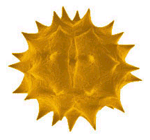
Pollen
Introduction
This fact sheet provides basic information about bell pollen.
Bee pollen is one of nature's superfoods, rich in vitamins, minerals, enzymes, amino acids and anti-oxidants. It is an immune system builder and it enhances vitality. Bee Pollen is literally being packed with goodness; it contains vitamin A, C, D, E, K and B complex, as well as lecithin, beta-carotene and selenium. It has 10 essential enzymes and co-enzymes and is a rich source of folic acid. rich in lecithin.
Common Names
Bee Pollen
What It Is Used For
- Bee pollen is believed to rejuvenate the body, stimulate organs and glands, enhance vitality, and bring about a longer life span.
How It Is Used
Pollen from flowers, collected by bees, mixed with bee digestive enzymes.
What the Science Says
- Modern folklore also says that people with asthma or hay fever will suffer less during pollen season if they eat local honey containing the pollen to which they are allergic. By taking one teaspoon to one tablespoon of local honey or bee pollen a day, some people swear that they get through the season with little or no symptoms. Presumably, the pollen immunizes them. However, there has been no medical research to back up those claims.
Side Effects and Cautions
- Bee Pollen should be avoided by anyone with an allergy to honey or bees, medical attention should be sort immediately.
- Bee Pollen should also be avoided by diabetics.
Sources







